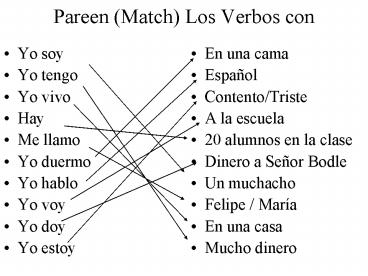Pareen (Match) Los Verbos con - PowerPoint PPT Presentation
1 / 45
Title:
Pareen (Match) Los Verbos con
Description:
Pareen (Match) Los Verbos con Yo soy Yo tengo Yo vivo Hay Me llamo Yo duermo Yo hablo Yo voy Yo doy Yo estoy En una cama Espa ol Contento/Triste A la escuela – PowerPoint PPT presentation
Number of Views:117
Avg rating:3.0/5.0
Title: Pareen (Match) Los Verbos con
1
Pareen (Match) Los Verbos con
- Yo soy
- Yo tengo
- Yo vivo
- Hay
- Me llamo
- Yo duermo
- Yo hablo
- Yo voy
- Yo doy
- Yo estoy
- En una cama
- Español
- Contento/Triste
- A la escuela
- 20 alumnos en la clase
- Dinero a Señor Bodle
- Un muchacho
- Felipe / María
- En una casa
- Mucho dinero
2
El Presente de los verbos
- A verb is a word that expresses an action or a
state of being. Words such as Hablar, Querer,
Vivir and Tener are verbs. In Spanish all verbs
belong to a family or conjugation. Verbs that end
in ar are called first conjugation verbs (or
simply AR verbs) because the infinitive form of
the verb ends in -AR. The infinitive is the basic
form of the verb that you would find in the
dictionaryit is not conjugated. There are also
ER (verbs that end in ER) and IR verbs. Some
verbs are irregular and do not follow the regular
pattern (tener, qerrer, ser, estar)
3
Say the following verbs out loud as a class
Remember Ll in Spanish sounds like a y in
English. Llegar in Spanish might be spelled
yegar in English
- Llegar
- Entrar
- Hablar
- Estudiar
- Mirar
- Tomar
- Sacar
- Llevar
- Enseñar
- To arrive
- To enter
- To speak
- To study
- To look at / watch
- To take / drink
- To get / take out
- To carry
- To teach
4
Every verb has 2 parts
STEM ENDING
AR (infinitive ending)
- Hablar habl-
- Llegar Lleg-
- Entrar Entr-
- Estudiar Estudi-
- Mirar Mir-
Tomar Tom- Sacar Sac- Llevar
Llev- Enseñar Enseñ- Comprar Compr-
5
To form the present tense add these endings to
the verb stems
STEM Verb ending
6
hablar
Por ejemplo
ar
habl
7
Who is doing the action will determine how to
conjugate the verb. Study the following exmples.
Pay attentention to the Subject pronouns and how
they affect the verb endings.
Subject Pronouns
- Yo hablo español.
- Tú hablas español también.
- Él no habla español.
- Ella habla inglés y español.
- Usted habla español muy bien.
- Nosotros hablamos español mucho en esta clase.
- Ustedes hablan mucho en español y en inglés.
- Ellos también hablan mucho.
8
estudiar
Por ejemplo
estudi
ar
9
Llegar
Por ejemplo
lleg
ar
10
(No Transcript)
11
Present-tense verbs in Spanish can have several
English equivalents. Each simple expression in
Spanish may convey three different ideas in
English
(yo)
Estudio español.
- I study Spanish.
- I do study Spanish.
- I am studying Spanish.
simple statement
emphasis
action in progress
12
Cuál es la forma correcta?
- mi amigo y yo
- hablamos
el estudiante habla
hablar
13
Cuál es la forma correcta?
mi padre Lleva el dinero
unos amigos Llevan el dinero
El dinero
Llevar
14
Cuál es la forma correcta?
tú enseñas
El profesor enseña
enseñar
15
Cuál es la forma correcta?
Elena y José estudian
Laura y yo (Nosotros) estudiamos
estudiar
16
Cuál es la forma correcta?
yo Saco una buena nota
Julio Saca una buena nota
Sacar (una buena nota)
17
Cuál es la forma correcta?
Yo Miro
Uds. Miran
Mirar
18
Cuál es la forma correcta?
mis amigos Entran
Ramón y tú (uds.) Entran
Entrar (to enter)
19
Cuál es la forma correcta?
la clase toma
las alumnas toman
Tomar (to drink)
20
Cuál es la forma correcta?
El bus escolar Llega
Los alumnos Llegan
Llegar (to arrive)
21
Ellos ________ buenas notas.
Sacar
22
Los amigos ________ la televisión.
Mirar
23
La Señora ________ a casa.
Llegar
24
El muchacho ________ por teléfono.
Hablar
25
Nosotros ________ por (through) la puerta (the
door).
Entrar
26
La maestra(the teacher) ________ el piano.
Enseñar
27
El Alumno ________ matematicas.
Estudiar
28
El hombre ________ la computdora y ________ por
la puerta.
Llevar / Entrar
29
La maestra ________ a los alumnos. (enseña)
30
Tú ________ la cajas (the boxes). (llevar)
31
Él ________ golf.
(enseñar)
32
La señora ________ mucho. (habla)
33
Yo ________ una buena nota. (sacar)
34
La señora _____ la televisión y ______ por
teléfono. (Mirar / hablar)
35
Julio ________ una siesta (nap). (tomar)
36
Ustedes ________ unas bebidas (some drinks).
(tomar)
37
El papá ________ a casa. (Llegar)
38
Pepé ________ por teléfono. (Hablar)
39
Juan Diego ________ la casa por la puerta.
(Entrar)
40
La profesora ________ la clase. (Enseñar)
41
Los voluntarios ________ por teléfono. (Hablar)
42
El esposo ________ la esposa. (Llevar)
43
El alumno no ________ mucho. (Estudiar)
44
- I speak (talk) in class.(en la clase)
- She studies.
- They (those girls) arrive at 800 A.M.
- We watch the movie (la película).
- You (tú) are drinking the water (el agua).
- You guys are carrying the money.(el dinero)
Yo hablo en clase.
Ella estudia.
Ellas llegan a las ocho.
(Nosotros) miramos la pelicula
Tú tomas el agua.
Uds. Llevan el dinero.
45
- He enters spanish class at 10 am.
- Who studies a lot?
- Elena talks in class.
- I study mathemáticas.
- We are watching the girls.
- They get good grades.(buenas notas)
Él entra la clase de español a las 10 de la
mañana.
Quién estudia mucho?
Elena habla en clase.
Yo estudio matemáticas.
(Nosotros) miramos las muchachas.
Ellos sacan buenas notas.































